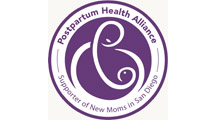Postpartum Health Alliance

Postpartum Health Alliance is a non-profit organization dedicated to raising awareness about perinatal mood and anxiety symptoms and disorders and providing support and treatment referrals to women and their families.
Featured on these Episodes
-

Delayed Postpartum Depression: Expectations
Sometimes parenting doesn’t turn out the way we planned. We may envision our birth plan unfolding perfectly, followed by days, weeks, months or years of complete happiness as we watch our children grow. But reality can look much different. What happens when our expectations aren’t fulfilled? How can that lead to depression and fears of failure as a new mother?
-

Delayed Postpartum Depression: Having More Babies
Having another child after experiencing postpartum depression, or another perinatal mental health disorder, may seem daunting as a new mother. What if it happens again? What if it is worse? Who would sign themselves up for this experience again? How can you reconcile this fear with the longing for more babies?
-

Delayed Postpartum Depression: Relationships
Bringing home a baby is a major life-changing event. As parents, we are all adjusting to new baby and a new identity. This inevitably impacts our relationship with one another as well as with family and friends. What are the common stressors that trigger how we interact with other people? How can we communicate our feelings in a healthy and constructive way without creating distance? And what are some ways we can create reasonable expectations so our relationships can thrive?
-

Delayed Postpartum Depression: Self Care
Being a parent inevitably involves sacrifice. There less money, less sleep, and less time for yourself. As a mother, finding time to care for yourself is essential but can seem like an impossible task. Not only may it seem impractical, but it may even feel selfish. How can you find the time and energy to help yourself so you can care for your children? How do you overcome guilty feelings of putting yourself before the needs of others?
-

Delayed Postpartum Depression: The Symptoms
Many people think mood disorders, such as postpartum depression, must begin immediately after having your baby. But that’s simply not true. Delayed postpartum depression can occur 18 months after birth or later depending on hormonal changes within the mother’s body. So, would you know if you’re experiencing delayed PPD or if something else is wrong? Today we’re looking at the main symptoms that when left untreated, can even impact future pregnancies.
-

Delayed Postpartum Depression: Toddler Transition
Caring for a toddler is both an exciting and challenging adventure, for any parent. If you’re struggling with postpartum depression or another postnatal mood disorder, this transition may seem completely overwhelming. So, how can you better prepare yourself? How do you manage your child’s temper tantrums when you might be on the verge of doing the same thing yourself? We’ll explore some tips to help give you more structure to help both you and child feel more secure.